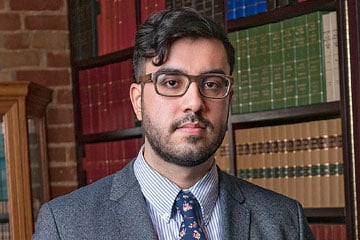
The Law Society of Ontario’s independent equity advisory group is asking benchers to let the profession weigh in on whether and how to replace the statement of principles requirement.

The Law Society of Ontario’s independent equity advisory group is asking benchers to let the profession weigh in on whether and how to replace the statement of principles requirement.
In a 15-page open letter to Convocation, Nima Hojjati, chair of the LSO Equity Advisory Group, asks benchers not to repeal the statement of principles without a consultation or contingency plan first.
“The Equity Advisory Group, its members, and its partner organisations, will participate in the consultation process to repeal, replace, or amend the statement of principles, if that is the will of Convocation,” said the June 12 letter.
Since submitting their 2017 annual reports, Ontario lawyers have been required by the law society to create a written statement of principles that “acknowledges your obligation to promote equality, diversity and inclusion generally, and in your behaviour towards colleagues, employees, clients and the public.” In an election that ended April 30, the majority of lawyers elected said they did not support this requirement.
Hojjati says two motions — one to repeal the statement of principles requirement and another to make it optional — will come before benchers at the law society’s board meeting on June 27. Because new benchers joined the board in May, and the treasurer (who appoints committee members) is elected in June, there haven’t been the usual committee meetings to prepare for these key votes, he tells Law Times.
The equity advisory group, unlike many law society groups, is not comprised of benchers and has no voting power. It was created to help benchers and members of the LSO’s equity and Indigenous affairs committee in “identifying and advising …. on issues affecting equity communities.” It includes individual members representing a range of practitioners from law students to managing partners of Bay Street firms, as well as representatives from several equity-seeking groups: The Arab Canadian Lawyers’ Association, ARCH Disability Law Centre, Association des juristes d'expression française de l'Ontario, Canadian Association of Black Lawyers, Canadian Association of Somali Lawyers, Canadian Hispanic Bar Association, Canadian Muslim Lawyers Association, Federation of Asian Canadian Lawyers, Law Students’ Society of Ontario, Ontario Paralegal Association, Roundtable of Diversity Associations and South Asian Bar Association.
In the past year, the group has provided submissions on issues such as licensing, governance reform, changes to tribunal rules and access to justice initiatives.
Hojjati says that unlike other law societies, Ontario lawyers cannot vote through referendum, so consultations have traditionally been how benchers gauge public and professional opinions on issues. He also says that while the anti-statement-of-principles benchers won the election, only about 30 per cent of lawyers voted.
“Obviously I recognize that this is how democracy works. Whoever votes is who has power. But once you have the power, I think there are other steps that are important to be respected in democracy. By all means, they have the right and authority to do whatever they want and they can interpret their political mandate as they wish,” he says. “I don’t want to speak for EAG …. I don’t see self-regulation as one vote that defines an agenda for four years. I see it as a process — if you are elected to get rid of the statement of principles, go for it, but do it properly and in the spirit of democracy.”
During the bencher election, some critics have noted that incumbent benchers have also made major decisions, such as changing the law society’s name, without seeking a referendum-style vote or approval from the profession. Hojjati says he would personally be open to considering a change to that procedure, although the group has no authority to do so, beyond advising the equity and indigenous affairs committee.
“The main issue is for any vote to respect the process that has been historically established at the law society so that nothing is rushed. We don’t have any real power at the law society, we are only there to provide our experiences, it’s not up to us,” he says. “But it shouldn’t be a month-long period — with no meetings, no consultation, no reaching out to the profession — that leads to a decision that affects 20 years of consultations.”
Although many of the members of EAG have said they support the statement of principles requirement over the years, he says the equity advisory group hasn’t done an official consultation or taken an official position on the question, as it has not been put to them by Convocation for new feedback. A representative for the Stop-SOP group said they had not seen the letter and had no comment on the matter.
“The consultation [in the past] has been around, ‘What do we do for equity initiatives?’,” he says. “If we are going to take that and change it, it changes its nature of the consultation, too. If the question posed is, 'Do we get rid of or modify the statement of principles?,’ that requires new feedback from the profession, at least in my view. Maybe the benchers should come out and say, ‘We have considered everything that has been said, and we decided that we know better, and we don’t want to follow the consultations.’ If the position is not to respect anyone’s opinion except their own, that should be the truth that’s put out there.”